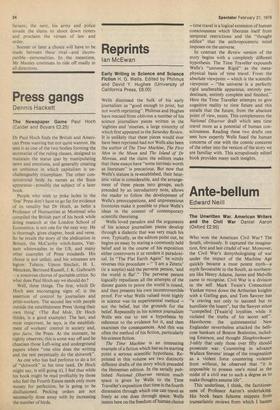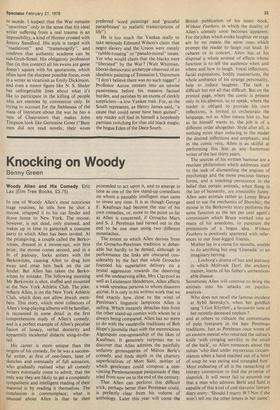Ante-bellum
Edward Neill
The Unwritten War. American Writers and the Civil War Daniel Aaron (Oxford £2.95) Who won the American Civil War? The South, obviously. It captured the imagination, first and last citadel of war. Moreover, the Civil War's demythologising of war under the impact of the Machine Age quickly became a most potent myth—a myth favourable to the South, as northerners like Henry Adams, James and Melville came to recognise. Civil War is a division in the self. Mark Twain's Connecticut Yankee mows down the Arthurian knights with a Gatling gun, and Tom Sawyer has "a craving not only to succeed but to humiliate the losers", but the Sawyer ethos "compelled [Twain's] loyalties while it violated the truths of his secret self". Hawthorne the quintessential New Englander nevertheless attacked the bellicose bunkum of Boston Brahmins, including Emerson, and thought Slaughterhouse5-ishly that only those over fifty should prosecute war. Countering in advance Wallace Stevens' image of the imagination as a violent force countering violence from without, he observed that "it is impossible to possess one's mind in the midst of a civil war to such a degree as to make thoughts assume life".
This underlines, I think, the factitiousness of Professor Aaron's undertaking. His book bears fulsome snippets from transatlantic reviews from which I hasten to secede. I suspect that the War remains "unwritten" only in the sense that his ideal writer suffering from a real trauma is an Impossibility, a kind of Homer crossed with Jeremy Sandford. His style is turgid with ,`maelstrom" and "transmogrify", and confirms that authentic academe can be sub-Grub-Street. His obligatory profession that (in this context) all his swans are geese doesn't square with his quotations, which often have the sharpest possible focus, even in a writer as vicarious as Emily Dickinson, and even a minor figure like N. S. Shaler has unforgettable lines about what it's like to participate in the killing of people who are enemies by convention only. In trying to account for the feebleness of the mass of literature about the war he has a vein of Chauvinism that makes John Timpson look like Germaine Greer ("Busy men did not read novels; their wives
preferred 'word paintings' and 'graceful paraphrases' to realistic transcriptions of life").
He is too much the Yankee really to take seriously Edmund Wilson's claim that negro slavery and the Union were merely "rabble-rousing" or "pseudo-moral" issues. Yet who would claim that the blacks were "liberated" by the War? (Walt Whitman, liberal-democratic archetype observed of an idealistic painting of Toussaint L'Ouverture "I don't believe there was no such nigger") Professor Aaron retreats into an unwise passiveness before his massive factual burden, and perishes by an excess of clerkly scepticism—a low Yankee trait. For, as the South represents, as Henry James said, "a cause that could never have been gained", any reader will find in himself a hopelessly partisan twitching for that old black magic, the bogus Eden of the Deep South.



































 Previous page
Previous page